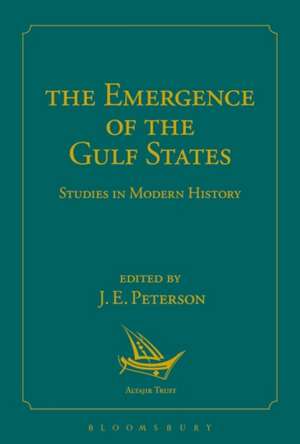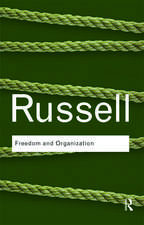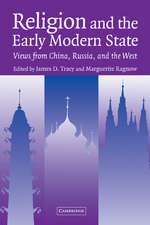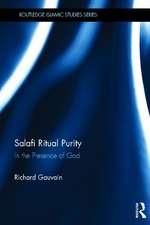The Emergence of the Gulf States: Studies in Modern History
Editat de Dr John Petersonen Limba Engleză Hardback – 15 iun 2016
Preț: 962.19 lei
Preț vechi: 1708.90 lei
-44% Nou
Puncte Express: 1443
Preț estimativ în valută:
184.17€ • 200.12$ • 154.81£
184.17€ • 200.12$ • 154.81£
Carte tipărită la comandă
Livrare economică 21 aprilie-05 mai
Preluare comenzi: 021 569.72.76
Specificații
ISBN-13: 9781472587602
ISBN-10: 147258760X
Pagini: 408
Ilustrații: 6 colour maps and 30 bw illus
Dimensiuni: 156 x 234 x 28 mm
Greutate: 0.76 kg
Editura: Bloomsbury Publishing
Colecția Bloomsbury Academic
Locul publicării:London, United Kingdom
ISBN-10: 147258760X
Pagini: 408
Ilustrații: 6 colour maps and 30 bw illus
Dimensiuni: 156 x 234 x 28 mm
Greutate: 0.76 kg
Editura: Bloomsbury Publishing
Colecția Bloomsbury Academic
Locul publicării:London, United Kingdom
Caracteristici
Highly illustrated and includes a glossary, chronology and a bibliographical essay detailing relevant primary and secondary sources
Notă biografică
J. E. Peterson is affiliated with the Center for Middle Eastern Studies at the University of Arizona, USA. He has been a Fellow at the Foreign Policy Research Institute (Philadelphia) and the Middle East Institute (Washington, D.C.), and an Adjunct Fellow at the Center for Strategic and International Studies (Washington, D.C.). Until 1999, he served as the Historian of the Sultan's Armed Forces in the Office of the Deputy Prime Minister for Security and Defence in Muscat, Sultanate of Oman, and spent 2000-2001 at the International Institute for Strategic Studies in London.
Cuprins
Editor's Introduction (J.E. Peterson, independent historian and political analyst, USA)Section 1: The Setting1. Trends and Patterns in the Archaeology and Pre-Modern History of the Gulf Region (Daniel Potts, New York University, USA)2. Religion and Religious Movements in the Gulf, 1700-1971 (Michael Crawford, independent consultant and writer, UK)Section 2: Historical Aspects of International and Intra-Regional Relations in the Gulf3. Patterns of Intra-Gulf Relations: Iraq and the Gulf until 1980 (Hala Fattah, independent scholar and consultant, Jordan); Arabia and Iran (Lawrence G. Potter , Columbia University, USA)4. The Age of Imperialism and Its Impact on the Gulf (J.E. Peterson, independent historian and political analyst, USA)5. The Gulf, the Indian Ocean, and the Arab World (Fahad Bishara, College of William and Mary, USA and Patricia Risso, University of New Mexico, USA) Section 3: Economic History6. The Economic Transformation of the Gulf (Bernard Haykel, Princeton University, USA, Clive Holes, Oxford University, UK, Fahad Bishara, College of William and Mary, USA, James Onley, Exeter University, UK and Steffen Hertog, London School of Economics, UK) Section 4: Social History7. Tribes and Tribal Identity in the Arab Gulf States (Dale Eickelman, Dartmouth College, USA)8. Social Structures and Transformation in the Gulf and Arabia until 1971 (Hala Fattah, independent scholar and consultant, ) 9. Language, Identity, and Culture (Clive Holes, Oxford University, UK)10. Six Sovereign States: The Process of State Formation (Frauke Heard-Bey, National Archives, Abu Dhabi)11. The Oil-Driven Nation-Building of the Gulf States After World War II (Steffen Hertog, London School of Economics, UK)GlossaryChronologyNotes on ContributorsIndex
Recenzii
A pioneering work ... Anyone who wants to understand the modern Gulf should read and re-read the work and reflect on it.
This collection of 11 papers on Saudi Arabia and the five Persian Gulf states that emerged from British rule between 1961 and 1971-Kuwait, Bahrain, Qatar, Oman, and the United Arab Emirates-represents an excellent, state-of-the-art overview of their history up until independence. All essays are by leading scholars, and each offers a wealth of information on such topics as historical trade structures, mutual links, international relations, social formation, tribal identity, economic transformation, and the role of oil in the region's development. To this reviewer, two chapters stand out: one, by the editor, offers a lucid discussion of the impact of imperialism on the Gulf; the other, by Clive Holes, examines the complex issue of language and dialect, folklore, and dress of the region's peoples. Each chapter ends with a useful, up-to-date bibliographical essay of English-language scholarship. A rich volume that belongs in every research library. Summing Up: Essential. Upper-division undergraduates and above.
This collection of 11 papers on Saudi Arabia and the five Persian Gulf states that emerged from British rule between 1961 and 1971-Kuwait, Bahrain, Qatar, Oman, and the United Arab Emirates-represents an excellent, state-of-the-art overview of their history up until independence. All essays are by leading scholars, and each offers a wealth of information on such topics as historical trade structures, mutual links, international relations, social formation, tribal identity, economic transformation, and the role of oil in the region's development. To this reviewer, two chapters stand out: one, by the editor, offers a lucid discussion of the impact of imperialism on the Gulf; the other, by Clive Holes, examines the complex issue of language and dialect, folklore, and dress of the region's peoples. Each chapter ends with a useful, up-to-date bibliographical essay of English-language scholarship. A rich volume that belongs in every research library. Summing Up: Essential. Upper-division undergraduates and above.













